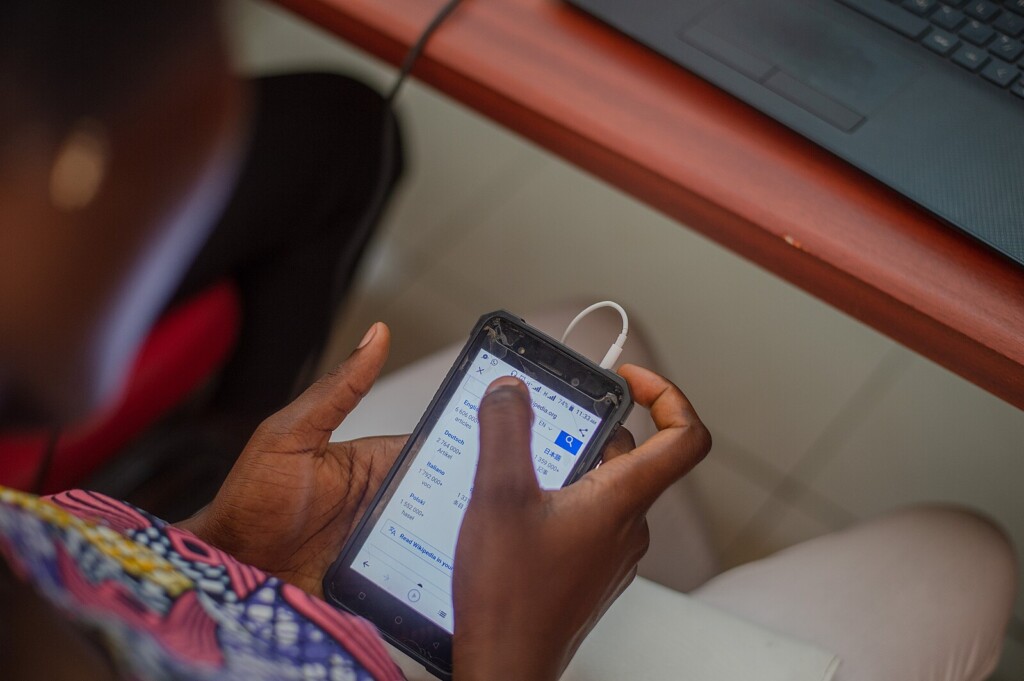Sudan Media Forum: ‘Arbitrary detentions and social media incitement undermine rule of law’

Person uses a smartphone (Photo: Wikimedia Commons)
Sudan Media Forum – Joint Editorial Room
Compiled by Sudanile
A displaced man from Omdurman has spent over three months in arbitrary detention in Northern State, after being accused without evidence in what his family says was a politically motivated campaign on social media, according to Sudanile.
Essam Abdelrahman, a pseudonym used for security reasons, was stopped by the Sudanese Armed Forces’ intelligence on 23 March 2024 while driving in Ed Debba, where his family had resettled after fleeing the war.
Officers verbally accused him of “supplying the [paramilitary] Rapid Support Forces (RSF) with fuel” but produced no arrest warrant or evidence. His family believes the accusation stemmed from an anonymous tip-off likely linked to the “Report a Collaborator” campaign on social media.
“He had no political or military involvement,” Essam’s sister told Sudanile. “He was just trying to rebuild his life after being displaced. Then suddenly, he was accused, arrested, and we weren’t allowed to visit or even find out where he was being held.”
Despite the family’s efforts to hire a lawyer and consult official detainee lists, Essam’s name has never appeared. His whereabouts remain unknown.
‘Social media accusations turn into arrests’
Sudanile reviewed content from Facebook pages including “Report a Collaborator” and “Report a Civil Collaborator,” which publish names and photos of civilians allegedly cooperating with the RSF, calling on security forces to “take the necessary action”.
Observers say these pages incite political and social targeting without due process. Emergency lawyers warn the campaigns violate the presumption of innocence and have already resulted in arbitrary detentions and killings, often based on residence or tribal affiliation, rather than evidence.
‘A war with no rules’
Dr Ibrahim Kabashi, professor of political science, told Sudanile: “What we’re living through now is a daily hunt, with people constantly being reclassified based on shifting accusations. These descriptions are pushed by different actors to serve political or social agendas. The war is no longer in the hands of the parties, anyone with an agenda can influence the field.”
He added: “People are forced to choose between safety and hunger, between survival and being seen as loyal to whoever controls their area. These are not choices made from belief; they’re imposed by necessity.”
Kabashi said the war has militarised Sudanese society with no checks or balances. “Information is being weaponised to settle scores, political, personal, even sports related. People are judged based on past impressions or personal grudges. As hate speech rises, the rule of law has collapsed, and trust in the judiciary is gone. Repression is now extending far beyond the frontlines.”
‘No legal foundation’
Mohamed Salah, a lawyer with the Emergency Lawyers Authority, said the campaign was not launched by any formal institution. “It came from army supporters on social media. Civilians are stuck between two forces, the RSF, which is tightening control, and army loyalists who accuse them without proof.”
“These accusations have no legal basis,” he said. “They’re used as an excuse to detain or even eliminate people without trial.”
Salah added: “In army-controlled areas, what’s happening can’t be called fair trials. Dozens of people are arrested without access to lawyers or timely court appearances. Some have been locked up for more than a year with no hearing, a clear violation of the law.”
‘Risk to the social fabric’
Political analyst Mohamed Turshin warned the campaign has become a serious threat to Sudan’s community cohesion. “Labelling entire groups as collaborators with one side of the war fuels tribal divisions and could spark revenge cycles that spiral out of control, especially with the state so weak and the legal system in ruins.”
“What these campaigns are telling the world is bleak,” he said. “Sudan is being seen as a country where justice and institutions have collapsed, and war is being run through Facebook pages.”
All three experts called for the immediate restoration of judicial institutions, an end to incitement, and guarantees of due process and fair trials.

This article, prepared by Sudanile and published by the Sudan Media Forum and its member institutions, sheds light on how social media incitement is being used in the absence of state institutions to carry out politically motivated arrests and fuel hate speech.








 and then
and then